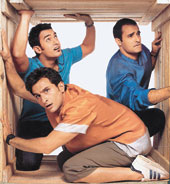 |
| (Above) A moment from Dil Chahta Hai and (left) Shah Rukh and Kareena in Asoka |
He has edited more than 200 films and lapped up seven National awards. He has punctuated films by everyone from Mani Ratnam to Farhan Akhtar. No wonder Sreekar Prasad is known as the safest scissorhands in the Indian film industry.
Yet, the man is still as charged up as he probably was on the post-production table of his first film. ?After a lengthy stint with editing for half my age, there have been luckily no motivational problems because I have not stuck to editing one kind of cinema or one language. I have made a conscious effort to do different films, from small budgeted art house movies to blockbusters in various languages. This makes it less predictable work for me every day. Even now, once I am in the editing suite, I tend to be drawn into the magic of film-making as it is a new experience every time with new stories and different actors,? Sreekar tells Metro.
He doesn?t mind that the spotlight has never been on editors and he is still largely an unknown name outside the industry. ?Even now editors are not really noticed and even the process or its importance to film-making is not known by many. Another reason is they are not part of shooting which is covered extensively by the media. Any way, it does not bother me much as I love to be behind the scenes and concentrate on my work. The success of an editor is when his cuts are not felt by the audience and the flow of the film is seamless.?
The man with the real right to say ?cut? also believes the editor-director working relationship is integral to the film. ?I prefer to do the first cut myself as I can get in a different perspective. It also makes it easier for the director to see an edited version from which he can try to improvise.?
Sreekar sure has his favourites. ?With Mani Ratnam, it is a very intense session. Though he knows what he wants, he gives me a lot of freedom in the first cut. Thus in many instances, he gets more than what he wants. During his editing, my focus is always on getting all the good performances into the edited version.?
Cinematographer-turned-director Santosh Sivan is another person Sreekar loves to work with. ?He is a bundle of energy and when he is sitting with me during edit he would be firing ideas like a machine gun. We have a good understanding and it is reflected in all the work I have done with him like Terrorist, Malli, Asoka. All the films are full of energetic editing. As he is always willing to experiment, it gets the best out of me. I was especially happy with my edit for Asoka as it had a unique way of putting together many shots to create a single action and yet it would be seamless.?
Sreekar also has a special mention for Farhan Akhtar. ?Working with him in Dil Chahta Hai was fun. Here was a young director who was very clear about what he wanted and he was also able to execute his film as per his script.?
But it was Mani Ratnam?s Yuva which Sreekar found most challenging. ?Mani Ratnam had shot the film in different styles for the three main characters. So my editing too had to complement it. For Abhishek?s story he used handheld camera. It was predominantly cut in one camera axis and all the cut points were made in a way to create an urgency and energy around that character. In Vivek Oberoi?s portions, I have used ramps and speed-up of shots to give it a younger feel. The Ajay Devgan portions were kept smooth and laidback with lengthier takes to make it go with his character.?
And it was for the Fanaa song in Yuva only that Sreekar used the MTV school of jump cuts. ?MTV is quite interesting to watch and tempting for many to get influenced by. What many film-makers don?t understand is there is a great difference between television and film screen in terms of the eye registering visual content because of the size of the image. So I am always careful about the duration and timing of the shots I keep on screen.?
Mahesh Dattani?s Morning Raga has been paced by Sreekar. ?The film is a good mix of classical and modern music. The difficulty in editing classical singing is that we have to make sure we get the right takes of the artiste crooning as their singing and talam have to match and also we have to make sure the images we use match the musical tempo. In this case we had Shabana Azmi singing classical songs so well that at many places we kept the singing in single shots.?
The awards that keep piling on his desk are a continual boost to the man?s cutting edge. ?Awards are like a tonic. They motivate you to do better work with more responsibility but they are definitely not the beginning or end of all... I am more focused on the job at hand and the deadlines my producer usually has.?
Sreekar has also strayed into film production and is slated to take up direction soon. ?Deja Vu was produced by me to help out a friend in making his film which he was unable to do. Production is not my cup of tea, but I definitely have plans to direct a film and I am presently working on a script which is issue-based and emotional.?











